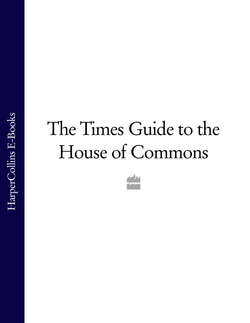Читать книгу The Times Guide to the House of Commons - Литагент HarperCollins USD, Ю. Д. Земенков, Koostaja: Ajakiri New Scientist - Страница 37
And the winner is…television
ОглавлениеAndrew Billen
Television Critic
The sky was dusty with volcanic ash and the airwaves thick with politics. Yet for a while the electorate refused to inhale. In a multichannel world, it is easy to avoid the news, easier still the election specials. ITVI’s studio debates, Campaign 2010 with Jonathan Dimbleby, lost rather than gained audience as the election wore on. The regular political gabfests, BBC One’s Question Time and The Andrew Marr Show, suffered dwindling not growing viewing figures. It was like soccer fans turning off Match of the Day during the World Cup.
If, like the grounded aeroplanes, the campaign was going to take off, it would take something new, and something different. It was supplied by three live, 90-minute election debates agreed between the politicians and networks after tortuous discussion. Their order having been decided by lottery, the first, ITV’s on April 15, centred on domestic policy. Its MC, Alastair Stewart, proclaimed it historic. Its 9.5 million viewers – a figure that would not disgrace a Saturday night Britain’s Got Talent – apparently agreed. But even Stewart could not have predicted that the commentariate and the focus-grouped would independently declare a clear winner in the Liberal Democrats’ Nick Clegg or that his party’s trend in the polls would go vertical. The debate was declared a “game changer”.
As talent contests, the following debates on April 22 and April 29 were less decisive, mainly because, what by now could be seen as Clegg’s challengers, Gordon Brown and, especially, David Cameron got better at them. Mr Cameron particularly mastered the “trick” of addressing the camera lens directly, a technique pioneered more than 50 years ago when hosts of Sunday Night at the London Palladium realised that faced with the choice of addressing the stalls or the nation’s sitting rooms it was wise to talk to the many not the few.
The second debate, focusing on foreign policy and held by Sky News, was a success for a channel whose political editor, Adam Boulton, had campaigned hard for them to happen. Its 4.4 million viewers was a record audience for a Sky News production. Ofcom, the regulator, received many hundreds of complaints, however, mainly because Boulton, as chairman, broke protocol by asking a question of his own. Most confidently staged was the BBC’s final “economic crisis debate”, although it attracted fewer viewers than the first. Its experienced host, David Dimbleby, intervened more than either Stewart or Boulton, but only to repeat his audience’s questions. In future such debates may have less constricted or more varied formats. It is, surely, impossible to imagine an election happening without them.
With even Jeremy Paxman’s traditional roastings of the leaders producing few headlines, only once outside the set-pieces did television change the agenda, and then it was by accident. A Sky News radio mike was left on and attached to Mr Brown as he sped from an unsatisfactory encounter with a pensioner supporter. She was, he told an aide, a “bigoted woman”. Within hours, his remarks were played back to him on Jeremy Vine’s Radio Two show. The camera showed him head in hands. After a self-immolating visit to Mrs Duffy’s home in Rochdale, Mr Brown emerged before more cameras bashfully declaring himself a sinner but a penitent one. The mini-soap looked a disaster for Mr Brown, but, as it turned out, his ratings had nowhere further to fall.
The election night programmes for the first time featured an exit poll jointly paid for by the BBC, ITV and Sky. Its prediction of a hung Parliament, with Mr Cameron short of an overall majority by 19, was initially treated with scepticism by the studio pundits, mainly because it insisted that the Lib Dems’ representation in Westminster would decline. It proved almost uncannily accurate. The result was so close that BBC One’s election programme, which began at 9.55pm on the Thursday did not end until 8.45am on the Friday. David Dimbleby, showing stamina uncommon in a septuagenarian, resumed his anchorman’s seat at 11am and carried on until 4pm. His efforts, showcased in a huge glass set built in Television Centre, earned the BBC more than 4 million viewers overnight. ITVI’s show, hosted by Alastair Stewart, attracted only an average of 1.26 million and was beaten by a satirical commentary on the results from Channel 4. Sky News did worse than it had five years before, its 111,000 viewers probably depleted by its new-fangled HD transmission causing its sound to ride out of synch.
And so, like the old politics, the senior mass medium endured. Just as there was no decisive breakthrough for the third party, there was none for multichannel or the blogosphere. Had television turned the election into a beauty contest? By the end it appeared more likely that its debates had found a new way to scrutinise not only character but policy and that those of each contestant had been found wanting. The Friday after polling day, Sandy Toksvig, chairwoman of Radio Four’s The News Quiz, made the Nick Clegg/Britain’s Got Talent comparison explicit. We saw someone new, liked what we heard but, in the end, decided to vote for someone else. At least, however, by then we knew whom we were voting for. After a foggy start, it was a good election for television.
